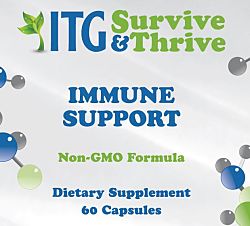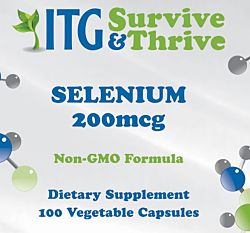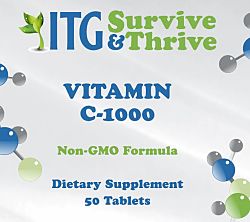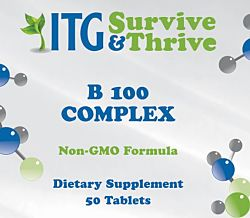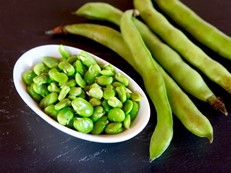Live Healthy Blog
The ITG Survive & Thrive blog delivers informative health tips, healthy resources and nutritional information to help you along your journey to better health and wellness.
Good Fat or Bad Fat?
- Font size: Larger Smaller
- Hits: 2121
- 0 Comments
 Over the years and from an early age, we've all been taught how bad it is to eat fat. From low fat foods, to reduced fat foods, to low fat lifestyles, avoiding fat has been engrained in our thinking: that eating fat will cause us to gain fat. While too much of any nutrient can very easily be converted and stored as fat in the body, fat is still an essential part of our diet. What types of fat are healthy, which should we eat in moderation, and what types should we avoid?
Over the years and from an early age, we've all been taught how bad it is to eat fat. From low fat foods, to reduced fat foods, to low fat lifestyles, avoiding fat has been engrained in our thinking: that eating fat will cause us to gain fat. While too much of any nutrient can very easily be converted and stored as fat in the body, fat is still an essential part of our diet. What types of fat are healthy, which should we eat in moderation, and what types should we avoid?
The ITG Diet is a low fat ketogenic diet in comparison to what you may have read about similar keto diets. Most keto diets allow an abundance of high fat foods such as bacon, cheese, heavy cream, nuts, and of course, lots of red meat. This is sometimes known as "dirty keto." While your body will most likely stay in ketosis while consuming higher levels of fat, you may have noticed a weight loss plateau. Eating too much fat can cause the body to burn off the fat you eat, rather than the stored body fat that you'd really like to get rid of. Eating too much fat? That will also just get stored as fat on your body. This can cause a stall in your weight loss progress, and although you're eating low carb and following your keto regimen strictly, you may give up trying a ketogenic diet thinking that it just isn't working anymore.
While stalls in weight loss can happen from time to time, filling out a food diary and logging everything that goes in your mouth can really help you and your Coach do some research. You might find that some of the foods you are eating have too many carbs or sodium, or may be too full of fat.
But fat isn't all bad: fat is the most concentrated source of calories, with 9 calories per gram (protein and carbohydrates have 4 calories per gram), and it is the most satiating of the macronutrients. Fat makes us feel fuller for longer, adds flavor to the foods we eat, supplies energy, and helps our bodies absorb fat soluble vitamins (Vitamins A, D, E, and K). Fats also provide the body with linoleic acid, which is essential for growth, healthy skin, and metabolism.
What are the types of fats and are they healthy or not?
Saturated Fats - these fats come from meat, eggs, and dairy. They can also be found in plant oils such as palm oil, coconut oil, and butter. Saturated fats are solids at room temperature and can raise LDL or "bad" cholesterol levels. Saturated fats should be consumed in lower quantities.
Unsaturated Fats - can be classified into two types: Monounsaturated fats and polyunsaturated fats. Both fats come from plants and vegetables. Monounsaturated fats are liquids at room temperature, but will solidify in the cold. Fats in this category are olive oil, grapeseed oil, avocado oil, and canola oil, to name a few. Remember that some of these oils may still be made up of some saturated fats, but they contain higher levels of monounsaturated fat. These fats should still be used in moderation, just a couple tablespoons a day for cooking. Polyunsaturated fats have been known to reduce levels of LDL "bad" cholesterol. Flaxseed oil, fish, canola oil, and eggs are some examples that contain polyunsaturated fat. Too much polyunsaturated fat can also HDL "good" cholesterol.
Trans Fats - trans fats are unsaturated fats, but can raise LDL "bad" cholesterol and lower HDL "good" cholesterol. Trans fats are rare in nature, but do occur in the meat and dairy of cattle, sheep and goats. They are made artificially when food producers turn liquid oil into solid fat, such as shortening or margarine, by the process of hydrogenation. Hydrogenation is relatively inexpensive and does not spoil easily, giving a longer shelf life to the foods it contains. The body does not need trans fats and the American Heart Association recommends less than 2 grams of trans fat per day on a 2,000 calorie diet, but ideally zero grams per day.
Omega Fatty Acids - Omega fatty acids are essential to health, meaning they can't be manufactured by the human body so they must be consumed. Fish, flax seed oil and other foods contain omega fatty acids. A restrictive diet in which not all essential fatty acids might be consumed should be supplemented with omega. ITG Omega 3-6-9 contains three of those essential fats in the correct proportion which may reduce the risks of heart disease and boost immune system.
As a rule of thumb, fat intake should be limited whether you're looking to lose weight or working on maintaining your new goal. Fat is not bad for the body, but too much fat will only get stored away, in the same way that too many carbs and too much protein are stored when consumed in excess. Make sure to keep an eye on those nutrition labels when you're shopping. If you stick to the perimeter of the grocery store when you shop, you'll be able to avoid a lot of the bad fats that are out there in processed foods, oils, and meats. Setting a limit on how much fat you eat will benefit your weight loss progress and help you stay on track to a healthier new you!


